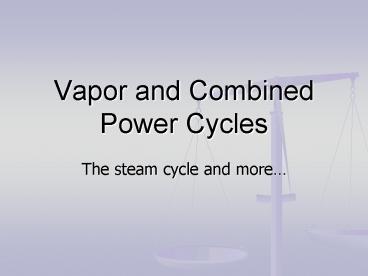Vapor and Combined Power Cycles - PowerPoint PPT Presentation
1 / 53
Title:
Vapor and Combined Power Cycles
Description:
Vapor and Combined Power Cycles The steam cycle and more Carnot Cycle The standard all others are measured against Not realistic model for vapor cycles Rankine ... – PowerPoint PPT presentation
Number of Views:209
Avg rating:3.0/5.0
Title: Vapor and Combined Power Cycles
1
Vapor and Combined Power Cycles
- The steam cycle and more
2
Carnot Cycle
- The standard all others are measured against
- Not realistic model for vapor cycles
3
Rankine Cycle, Ideal
- 1-2 isentropic compression (pump)
- 2-3 constant pressure heat addition (boiler)
- 3-4 isentropic expansion (turbine)
- 4-1 constant pressure heat rejection (condenser)
4
Rankine Cycle, Ideal
5
Rankine Cycle Energy Analysis
- Energy balance, each process
- For pump
6
Rankine Cycle Energy Analysis
- For boiler
- For turbine
- For condenser
7
Rankine Cycle Energy Analysis
- Thermal efficiency
- Heat rate amount of heat (Btu) to generate 1 kWh
of electricity
8
(No Transcript)
9
(No Transcript)
10
(No Transcript)
11
(No Transcript)
12
(No Transcript)
13
(No Transcript)
14
Real vs. Ideal Cycle
15
Real vs. Ideal Cycle
- Major difference is irreversibilities in pump and
turbine
16
(No Transcript)
17
(No Transcript)
18
(No Transcript)
19
(No Transcript)
20
Increase Efficiency?
- Lower condenser pressure
- Increase superheat temperature
21
Increase Efficiency?
- Increase boiler pressure
22
Reheat
- Materials limit temperature of steam, but can we
take advantage of higher steam pressures and not
have quality of steam issues?
23
Reheat
- Equations become
- Purposes of reheat keep turbine inlet temps
within limits, increase quality of steam in last
stages of turbine
24
(No Transcript)
25
(No Transcript)
26
(No Transcript)
27
(No Transcript)
28
(No Transcript)
29
(No Transcript)
30
Ideal Regenerative Rankine Cycle
- Regeneration effective use of energy
- Open (direct contact) feedwater heaters (mixing
chambers) - Closed feedwater heaters (heat exchangers)
31
Ideal Regenerative Rankine Cycle
32
Ideal Regenerative Rankine Cycle
33
Ideal Regenerative Rankine Cycle
34
2nd Law Analysis
- Ideal Rankine cycle is internally reversible
- Analysis indicates where irreversibilities are
- Again for steady-flow system
35
2nd Law Analysis
- For a cycle
36
(No Transcript)
37
(No Transcript)
38
(No Transcript)
39
(No Transcript)
40
Cogeneration
41
(No Transcript)
42
(No Transcript)
43
(No Transcript)
44
(No Transcript)
45
(No Transcript)
46
(No Transcript)
47
(No Transcript)
48
Combined Gas-Vapor Power Cycle
- Use of two cycles to maximize efficiency
- Gas power cycle topping a vapor power cycle
- Combined cycles have higher efficiency than
either independently - Works because
- Gas turbine needs high combustion temp to be
efficient, vapor cycle can effectively use
rejected energy
49
(No Transcript)
50
(No Transcript)
51
(No Transcript)
52
(No Transcript)
53
(No Transcript)































